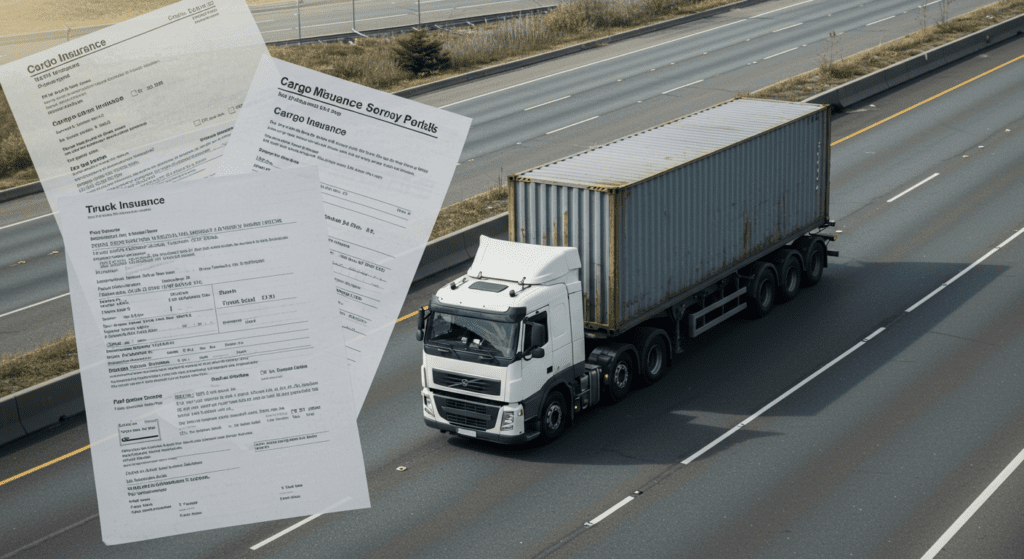1. Introduction to Liability Insurance in Trucking
Liability insurance plays a critical role in the trucking industry by providing financial protection against claims resulting from accidents, injuries, and property damage. As trucking operations involve significant risks, including long hours on the road, heavy cargo, and interactions with other vehicles, having robust liability coverage is essential.
This insurance ensures that trucking companies and drivers can manage unexpected events without facing debilitating financial losses, thereby maintaining business continuity and fostering trust with clients and stakeholders.

2. Understanding Types of Liability Insurance Coverage
There are several types of liability insurance coverage tailored to the unique needs of the trucking industry:
Public Liability Insurance: Covers injuries and damages to third parties, including pedestrians, other drivers, and property owners, resulting from trucking operations.
Cargo Liability Insurance: Protects against losses or damages to the goods being transported, ensuring that shippers and consignees are compensated for any mishaps.
General Liability Insurance: Provides broader coverage for various risks not specifically related to trucking, such as office accidents or employee injuries.
Environmental Liability Insurance: Addresses claims related to environmental damage caused by trucking activities, such as fuel spills or hazardous material leaks.
Professional Liability Insurance: Offers protection against claims of negligence or errors in the professional services provided by the trucking company.
Understanding these coverage types helps trucking companies tailor their insurance policies to address their specific risks and operational needs.
3. Legal Requirements for Trucking Companies
Operating a trucking business involves adhering to various legal requirements regarding liability insurance. Federal regulations, particularly those enforced by the Federal Motor Carrier Safety Administration (FMCSA), mandate minimum levels of liability coverage based on the type and weight of the vehicles used.
For instance:
Property Damage Liability: Required for all commercial vehicles, with minimum coverage limits varying by vehicle weight.
Bodily Injury Liability: Also mandated, covering costs related to injuries caused by accidents involving commercial trucks.
Compliance with these regulations is crucial to avoid fines, suspension of operating licenses, and other legal repercussions. Additionally, many states have their own specific insurance requirements, necessitating a thorough understanding of both federal and state laws to ensure full compliance.

4. Benefits of Liability Insurance for Truckers
Liability insurance offers numerous benefits to truckers, including:
Financial Protection: Shields trucking companies from the high costs associated with accidents, legal fees, and settlements.
Peace of Mind: Allows drivers and business owners to focus on their operations without the constant worry of potential liabilities.
Credibility and Trust: Demonstrates professionalism and reliability to clients, partners, and regulatory bodies, enhancing the company’s reputation.
Business Continuity: Ensures that unexpected incidents do not cripple the business, allowing for quick recovery and sustained operations.
Legal Compliance: Helps meet legal and contractual obligations, reducing the risk of penalties or loss of contracts due to inadequate insurance coverage.
These benefits collectively contribute to the stability and growth of trucking operations.
5. Risk Management and Liability Insurance
Effective risk management is integral to minimizing liabilities in trucking operations. Liability insurance complements risk management strategies by providing a safety net against unforeseen incidents. Key aspects include:
Risk Assessment: Identifying potential hazards in trucking operations, such as driver fatigue, vehicle maintenance issues, and route planning risks.
Preventive Measures: Implementing safety protocols, regular vehicle inspections, and driver training programs to reduce the likelihood of accidents.
Incident Response Plans: Establishing procedures for responding to accidents or claims, ensuring swift and effective management of incidents.
Insurance Integration: Aligning insurance coverage with the identified risks to ensure comprehensive protection.
By integrating liability insurance into a broader risk management framework, trucking companies can proactively address potential threats and mitigate their impact on operations.

6. Cost Factors and Premium Calculations
The cost of liability insurance for trucking operations is influenced by various factors, including:
Type and Size of Fleet: Larger fleets or those with heavier vehicles typically incur higher premiums due to increased risk exposure.
Driving Records: Companies with drivers who have clean driving histories often benefit from lower insurance costs, reflecting their lower risk profile.
Coverage Limits: Higher coverage limits provide greater protection but also result in higher premiums.
Operational Areas: Regions with higher accident rates or stringent regulations may influence premium costs.
Cargo Type: Transporting hazardous or high-value goods can increase insurance premiums due to the elevated risk associated with such cargo.
Understanding these factors enables trucking companies to make informed decisions about their insurance coverage and manage costs effectively.
7. Choosing the Right Insurance Provider
Selecting the appropriate insurance provider is crucial for obtaining the best liability coverage for trucking operations. Key considerations include:
Industry Expertise: Providers with specialized knowledge in the trucking industry can offer tailored policies and valuable insights.
Reputation and Reliability: Established providers with strong financial ratings and positive customer reviews are preferable.
Coverage Options: A wide range of coverage options allows for customization to meet specific operational needs.
Customer Service: Responsive and knowledgeable customer support ensures effective communication and assistance when needed.
Claims Handling: Efficient and fair claims processing is essential for minimizing disruptions and ensuring timely resolutions.
Thoroughly evaluating potential insurers against these criteria helps trucking companies secure the most suitable and reliable coverage.

8. Claims Process and What to Expect
Navigating the claims process is a critical aspect of dealing with liability insurance. Typically, the process involves:
Immediate Notification: Informing the insurance provider promptly after an incident occurs to initiate the claims process.
Documentation: Providing detailed information and evidence related to the incident, including accident reports, photos, and witness statements.
Assessment: The insurance company evaluates the claim, determining coverage applicability and liability.
Settlement or Litigation: Depending on the claim’s complexity, it may be settled through negotiations or require legal proceedings.
Resolution: Finalizing the claim through payment of settlements or other agreed-upon terms.
Understanding each step of the claims process helps trucking companies prepare adequately and respond effectively to incidents, ensuring a smoother resolution and minimizing potential disruptions.
9. Case Studies: Liability Insurance in Action
Examining real-world examples highlights the importance of liability insurance in trucking operations:
Case Study 1: A trucking company transporting hazardous materials was involved in an accident that caused environmental damage. Their environmental liability insurance covered the cleanup costs and legal fees, preventing significant financial strain and preserving the company’s reputation.
Case Study 2: A driver caused a collision resulting in injuries to another party. The company’s public liability insurance covered medical expenses and legal claims, avoiding a potential lawsuit that could have jeopardized the business.
Case Study 3: Cargo was damaged during transit due to improper securing. Cargo liability insurance ensured that the client was compensated, maintaining trust and ongoing business relationships.
These cases demonstrate how liability insurance serves as a critical safety net, enabling trucking companies to handle adverse situations effectively.

10. Future Trends in Trucking Liability Insurance
The trucking industry is evolving, and liability insurance must adapt to emerging trends:
Telematics and Telematics Data: The use of GPS and telematics devices provides insurers with detailed data on driving behavior, leading to more personalized and potentially lower premiums based on actual risk.
Autonomous Vehicles: As autonomous technology advances, liability insurance models are shifting to address the distribution of responsibility between vehicle manufacturers, software providers, and operators.
Cyber Liability: With increased reliance on digital systems, the risk of cyber-attacks and data breaches rises, prompting the inclusion of cyber liability coverage in trucking insurance policies.
Sustainability Initiatives: Environmental concerns are driving the need for more comprehensive environmental liability coverage as companies adopt greener practices and transport alternative energy sources.
Regulatory Changes: Ongoing changes in federal and state regulations require insurance providers to adapt policies accordingly, ensuring compliance and adequate protection for trucking companies.
Staying abreast of these trends allows trucking companies to anticipate changes in liability insurance and adjust their coverage strategies proactively, ensuring continued protection and operational resilience.
